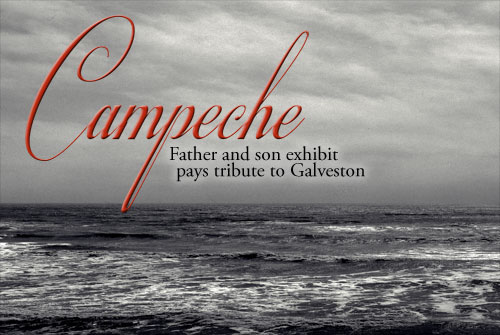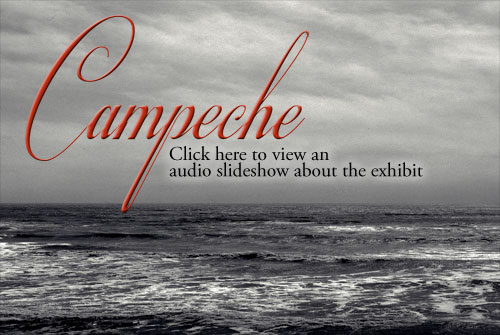CAMPECHE
Father and son exhibit pays tribute to Galveston
Jade Wise
The Signal
It has been said that a picture is worth a thousand words, but even a thousand words cannot describe the unique relationship between a father and his son.
Similarly, images and words share a relationship as old as time itself. One cannot hear or read the word “apple” without conjuring up a mental image of a round, juicy, crunchy, red, green or yellow fruit. Likewise, if one sees a photograph, or some other visual of this same fruit, a mental association is made between the image and the word—“apple.”
It is these relationships between father and son, and words and images, that make the relationship between photographer Van Edwards and his son, poet Joshua Edwards so special, as illustrated in the Edwards’ new book, “Campeche.”
Titled after the famed pirate Jean Lafitte’s name for Galveston Island, “Campeche” is a collection of poetry written by Joshua and photographs by his father Van.
Born and raised in Galveston and Clear Lake Shores – both being islands – Joshua feels a strong connection with the sea, as reflected in “Campeche.” Because of this connection, he places a lot of emphasis on the mythology of floods, water and nature.
“The book deals a lot with the idea of the visionary and the individual’s place in the context of the problems of the world, be it local or global,” Joshua said.
On the mythology of water, Van said, “Mythologically, and probably literally too, water in all mythology serves that function of birth and rebirth, arising and going.”
John Gorman, professor of literature at UHCL, points out that modern poetry is often rooted in mythology.
“Mythology helps give a sense of the continuity of culture.” Gorman said, “That people may have lived millennia ago, and yet, because of their stories, we understand something about our mutual humanity. It’s also a way to deepen a 21st century life that moves on the surface so much. You see the recurrences of patterns over 3,000 or 5,000 years of human time.”
“The idea for ‘Campeche’ belongs to Joshua,” Van said. “He wanted to create a dialogue between my photography and his, because it helped shape not only his poetry, but also his life. Henry David Thoreau said, ‘you can’t say more than you can see.’ But I’m a visual person so I can see more than I can say. My son [Joshua] is a poet, and he can say so much because he sees so well.”
This dual ability to be able to see the world around him and eloquently communicate it through poetry was brought about through Joshua’s home life. Joshua muses that with his father being a photographer and his mother being a librarian, there was not only the influence of reading and books, but also the idea of meditating on images.
“My dad’s aesthetic is sort of austere and formal and the poems in this book are kind of baroque,” Joshua said. “A lot of my poems take their inspiration from visionary poets like Whitman, Blake and the French symbolists, all of which are very formal. So I was interested in not only how his formalism and my formalism, but his austerity and my baroqueness or wordiness would interact.”
“‘Campeche’ is a very unique type of exhibit,” said Elbby Antony, assistant director of development in the office of university advancement, one of the offices responsible for bringing the exhibition to UHCL. “It is the first time we have had the pairing of two different types of art, the visual art and the poetic art.”
Professor of Fine Arts and Gallery Director, Nick de Vries said the “Campeche” exhibition is quite a meditative environment.
“I always enjoy showing the works of local individuals, especially those who have given a lot of time to the university and the area in general,” de Vries said. “Van being local and his son [Joshua] growing up in this area.”
The exhibit runs from Nov. 14 through Jan. 13, 2012 in the Art Gallery, located on the first floor of UHCL’s Bayou Building.


